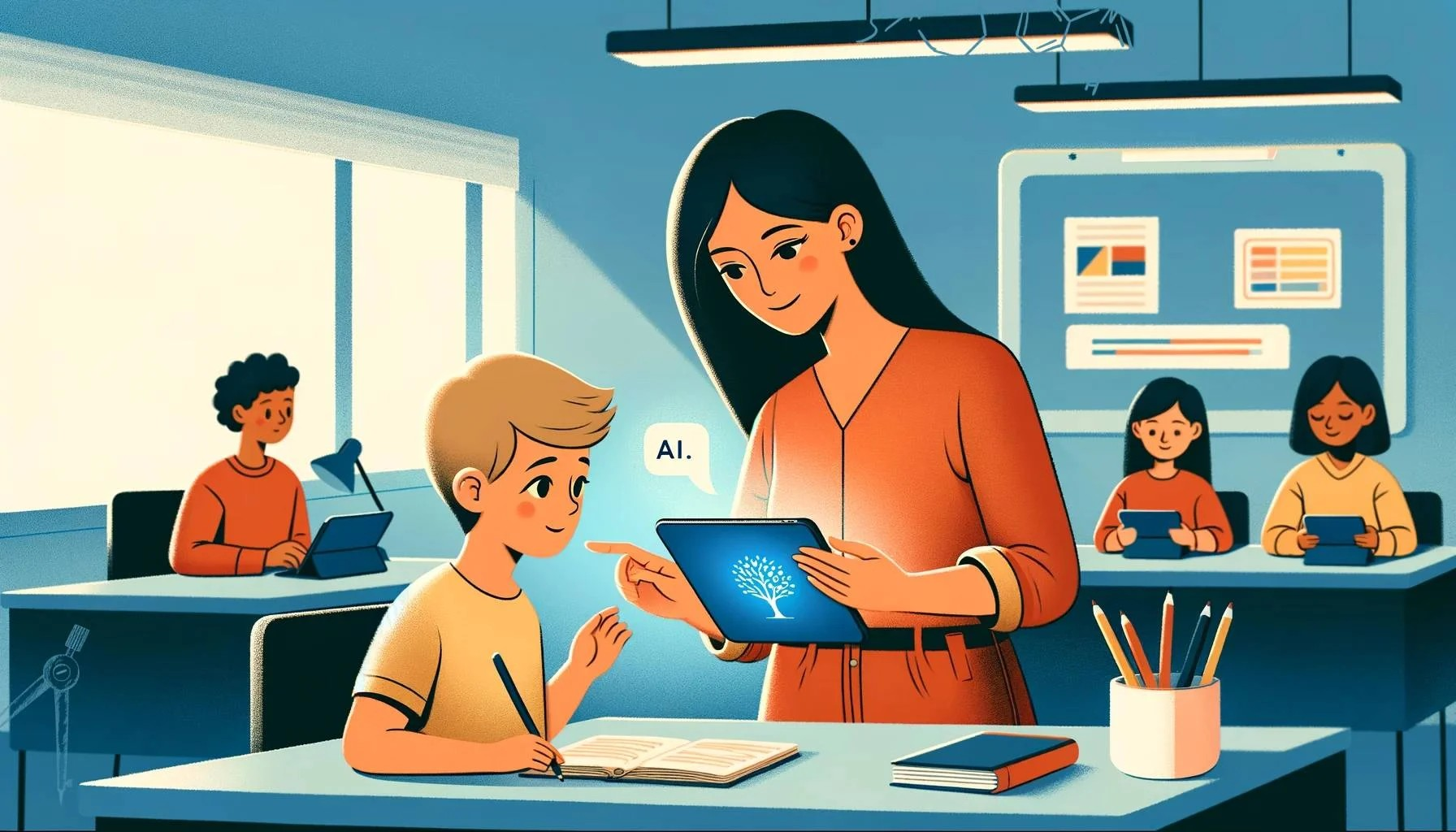5 Ways AI-Powered Assessments Are Transforming Classroom Instruction
The education landscape is constantly evolving, and with the rise of artificial intelligence (AI), we’re witnessing a revolution in how students learn and how teachers teach. One of the most significant advancements in this domain is the emergence of AI-powered assessments.
These innovative tools are transforming classroom instruction by providing personalized learning experiences, immediate feedback, and data-driven insights that were previously unimaginable.
- AI assessments customize learning by adapting to each student's needs and pace, providing a more personalized educational journey.
- Teachers get immediate feedback from AI, helping them quickly spot student struggles and adjust their methods.
- AI offers data-driven insights that enhance classroom instruction by highlighting trends, student progress, and areas for improvement.
- AI is transforming learning and teaching with new tools that help students and educators achieve better outcomes.
- As AI advances, education becomes more engaging and effective, benefiting students and teachers.
By the end of this lesson, students will have a deeper understanding of AI and its impact on education.
What Are AI-Powered Assessments?

AI-powered assessments use artificial intelligence to evaluate student learning comprehensively and personally. These assessments go beyond traditional methods by analyzing diverse data points to offer a detailed view of each student’s understanding.
- Comprehensive Evaluation: It delves into various data points, such as student responses, interaction patterns, and learning behaviors, to provide a holistic view of the educational experience.
- Personalized Insights: This method analyzes unique learning paths and preferences to offer a customized perspective on each student's needs, abilities, and progress, helping teachers tailor their instruction.
- Beyond Standardization: Unlike traditional testing methods that rely solely on standardized metrics, this approach provides a more detailed and nuanced understanding of student capabilities and areas for improvement.
- Emotional Analysis: This evaluation incorporates emotional cues, such as facial expressions and engagement levels, to assess how students are emotionally connected to the material, which can impact their comprehension and retention.
- Accurate Understanding: Compared to traditional assessments, this method delivers a more precise and comprehensive view of individual student understanding, allowing for more targeted educational strategies
How Are AI-Powered Assessments Different From Traditional Assessments?
Traditional assessments, such as multiple-choice tests or essays, often provide a limited snapshot of a student’s understanding. Grading them can take a lot of time, often causing delays in feedback that hinder learning. In contrast, AI-powered assessments offer several advantages.
- Personalization: AI algorithms can tailor assessments to students' strengths and weaknesses, ensuring they are challenged appropriately and receive targeted support.
- Immediate Feedback: AI-powered assessments can provide students with instant feedback, allowing them to identify areas for improvement and adjust their learning strategies accordingly.
- Data-driven Insights: These assessments generate valuable data that teachers can use to track student progress, identify learning gaps, and adjust their instruction to meet their students' needs.
- Efficiency: AI automates many aspects of the assessment process, freeing up teachers' time to focus on other essential tasks, such as providing individualized support and creating engaging learning experiences.
5 Ways AI is Revolutionizing Assessments

AI-powered assessments transform students’ evaluation, providing a more accurate and personalized approach to measuring understanding. Here are five ways AI is revolutionizing assessments:
1. Personalized Learning Journeys
AI-powered assessments leverage algorithms to analyze student performance data, identifying individual learning gaps and tailoring assessments to address students’ needs. This approach creates a personalized learning experience, challenging students appropriately and providing effective support.
- AI algorithms assess student performance data to pinpoint learning gaps.
- It creates personalized assessments to focus on each student's unique needs.
- The students benefit from a customized learning path through the curriculum.
- AI ensures students are challenged correctly and receive targeted support.
- It encourages self-paced learning, adapting to individual strengths and weaknesses.
- It enhances educational outcomes by addressing specific areas for improvement.
2. Instant Feedback and Guidance
AI-powered assessments offer a transformative approach to education. They provide immediate feedback and foster student self-regulation while freeing up valuable time for educators to focus on personalized support.
- AI assessments deliver instant results, helping students quickly identify and learn from their mistakes.
- The students gain a deeper grasp of underlying concepts through continuous feedback loops.
- It encourages students to take charge of their learning journey by developing self-assessment skills.
- It reduces grading workload, allowing teachers to dedicate more time to tailored support for individual students.
- It streamlines the learning process by integrating technology and personal feedback.
3. Data-Driven Insights for Teachers
AI-powered assessments offer educators valuable insights into student performance, helping them refine their teaching strategies. By leveraging data from these assessments, teachers can tailor instruction to address better each student’s needs and the class as a whole.
- It gains a comprehensive understanding of student performance through detailed analysis.
- It monitors individual student growth and progress over time.
- It detects common misconceptions early and addresses them promptly.
- It adjusts instructional methods to suit the specific needs of the class.
- It empowers teachers to make better instructional decisions, enhancing student learning opportunities.
4. Engaging and Interactive Assessments
AI-driven assessments are transforming education by going beyond traditional multiple-choice tests. These innovative tools incorporate the gamification of motivating the students through simulations and adaptive questioning, enhancing engagement and interest.
Providing an interactive learning experience makes learning enjoyable while developing students’ critical thinking and problem-solving skills.
- It incorporates game-like elements to capture students' interest and make learning enjoyable.
- It provides students with hands-on, practical experiences that relate to real-world scenarios, promoting deeper understanding.
- It tailors questions to the individual student's level, ensuring they are challenged and supported in their learning journey.
- It enhances critical thinking and problem-solving skills, which are essential for success in the modern world.
- The students are more likely to develop a long-lasting enthusiasm for learning by making assessments more dynamic and interactive.
5. Identifying and Supporting Students at Risk
AI-powered assessments transform education by proactively identifying students struggling or at risk of falling behind. By analyzing performance data, these assessments enable teachers to tailor interventions and provide personalized support, ensuring every student has a chance to succeed.
- AI algorithms analyze student performance data to spot early warning signs of academic struggles.
- It has automated alerts to notify teachers about students needing extra support.
- It facilitates prompt action to address learning challenges before they escalate.
- It enables customized teaching strategies to meet individual student needs, helping ensure that all students can achieve their educational goals.
Examples Of AI-Powered Assessments In The Classroom
AI-powered assessments have found diverse applications within the classroom, reshaping traditional educational approaches. AI-driven formative assessments provide real-time feedback to students, helping them identify areas of improvement and focus their study efforts more strategically. These tools assist educators in understanding student progress, enabling the adaptation of teaching approaches to best meet each learner’s educational goals.
- Adaptive Learning Platforms: These platforms use AI to adjust the difficulty of questions based on student responses, providing a personalized learning experience that continually challenges and supports each student.
- Automated Essay Scoring: AI algorithms can evaluate written work, provide feedback on grammar, style, and content, free up teachers' time, and provide students with more immediate feedback.
- Intelligent Tutoring Systems: These systems provide personalized guidance and support to students as they work through problems, offering hints, feedback, and explanations tailored to their needs.
The Future of AI in Education

AI-powered assessments are revolutionizing education by delivering tailored learning experiences and real-time feedback. These advanced tools harness data-driven insights to foster a more equitable and effective educational environment, unlocking each student’s potential.
- Personalized Learning and Engagement: It tailors educational experiences to align with each student's needs, interests, and learning pace. Focusing on individual preferences increases student involvement and makes learning more relevant and enjoyable, ultimately leading to a more meaningful educational experience.
- Immediate Feedback and Improved Outcomes: It allows students to quickly understand their strengths and weaknesses by delivering real-time performance insights. With prompt feedback, they can adjust their learning strategies, enhancing their knowledge retention and overall learning outcomes.
- Data-Driven Insights: This strategy leverages data analytics to identify trends, strengths, and areas for improvement in individual and group contexts. These insights help educators refine their teaching methods to be more effective. At the same time, students gain a clearer understanding of their learning journey and can focus on areas that need enhancement.
- Equitable Access: By providing all students with the necessary resources and support, this practice ensures that everyone, regardless of their socio-economic or cultural background, has an equal opportunity to succeed academically. It fosters an inclusive learning environment where students are empowered to reach their full potential.
Addressing Concerns and Challenges
While the potential of AI-powered assessments to revolutionize education is undeniable, it’s important to approach this technology with a balanced perspective. It needs to address some challenges and concerns to ensure responsible and ethical implementation alongside the numerous benefits.
Ethical Considerations
Integrating AI in education raises important ethical concerns, particularly regarding data privacy and algorithmic bias. Addressing these issues requires the establishment of clear guidelines and the development of fair and transparent AI systems.
- Ethical use of student data is a major concern with AI-powered assessments.
- Vast amounts of student data raise questions about privacy and bias.
- It has clear guidelines and safeguards that are crucial to protect student data.
- AI algorithms trained on existing data may reflect societal biases.
- It has the potential for unfair or discriminatory outcomes for certain student groups.
- The development of fair, unbiased, and transparent AI algorithms is essential.
Teacher Training and Support
Proper teacher training and support are essential for the effective use of AI-powered assessments in education. Educators must learn to use these tools and analyze the data to enhance personalized learning and address each student’s unique needs.
- Adequate training and support are essential for successful integration.
- Teachers need to develop skills to use AI tools effectively.
- Professional development should focus on personalizing learning experiences.
- It has effective feedback, and addressing individual needs is a crucial goal.
Cost and Accessibility
Ensuring that AI-powered assessment tools are accessible to all students is important, particularly in overcoming the cost barriers some schools and institutions face. Here are some strategies to make these technologies more inclusive:
- Explore funding opportunities to support the adoption of AI tools in resource-limited schools.
- Develop affordable AI solutions tailored for educational purposes
- Promote the use of open-source AI tools to facilitate broader access in education.
Over-Reliance on Technology
AI-powered assessments provide many benefits in education but should uphold the importance of human interaction. Teachers are encouraged to integrate AI as a supplementary tool to boost their teaching methods while preserving the essential human connection in learning.
- AI assessments bring efficiency and insights to the educational process.
- Human interaction is vital for a comprehensive learning experience.
- Use AI as an enhancement, not a replacement, for traditional teaching.
- Balance technology with human elements for an effective educational environment.
AI-Powered Assessments Beyond the Classroom
While this article focuses on AI-powered assessments in K-12 classrooms, the technology’s applications extend beyond schools. Let’s explore how AI is transforming assessments in other educational contexts.
- Corporate Training: AI-powered assessments enhance corporate training by offering personalized learning, streamlining assessments, and improving efficiency. AI identifies skill gaps, provides immediate feedback, and automates content creation, allowing training managers to focus on strategic initiatives.
- Homeschooling: Homeschooling families use AI assessments for personalized learning paths, immediate feedback, and progress tracking. AI offers interactive resources and adaptive platforms, creating an engaging learning environment.
- Higher Education: AI automates essay scoring and provides personalized feedback in higher education, saving professors time. It also supports adaptive learning and streamlines research assessments for clarity and originality.
Final Thoughts
AI-powered assessments revolutionize education by personalizing learning, providing immediate feedback, and offering data-driven insights. By embracing these innovations, we can create a more engaging and effective learning environment for all students.
So, what are your next steps?
- Explore different AI-powered assessment platforms and tools to find the ones that best suit your needs and learning objectives.
- Start by incorporating AI-powered assessments into your existing curriculum and gradually expand their use as you gain experience.
- Read blogs, attend conferences, and connect with other educators to stay informed about the latest trends and innovations in AI in education.
- Share your experiences and best practices with AI-powered assessments with your colleagues and contribute to the growing community of educators using AI to enhance learning.
By embracing AI-powered assessments and implementing them thoughtfully, you can create a more engaging, motivating, and effective learning experience for your students. Book a demo or try different platforms to see which works best for your classroom.
Author
-

The PathBuilder team is a dynamic group of dedicated professionals passionate about transforming education through adaptive learning technology. With expertise spanning curriculum design, AI-driven personalization, and platform development, the team works tirelessly to create unique learning pathways tailored to every student’s needs. Their commitment to educational innovation and student success drives PathBuilder’s mission to redefine how people learn and grow in a rapidly changing world.
View all posts

















The PathBuilder team is a dynamic group of dedicated professionals passionate about transforming education through adaptive learning technology. With expertise spanning curriculum design, AI-driven personalization, and platform development, the team works tirelessly to create unique learning pathways tailored to every student’s needs. Their commitment to educational innovation and student success drives PathBuilder’s mission to redefine how people learn and grow in a rapidly changing world.